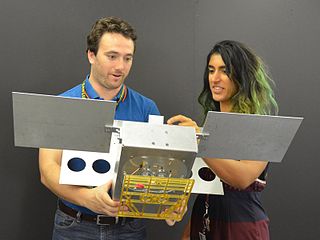Related Research Articles

A profession is a field of work that has been successfully professionalized. It can be defined as a disciplined group of individuals, professionals, who adhere to ethical standards and who hold themselves out as, and are accepted by the public as possessing special knowledge and skills in a widely recognised body of learning derived from research, education and training at a high level, and who are prepared to apply this knowledge and exercise these skills in the interest of others.

Research is "creative and systematic work undertaken to increase the stock of knowledge". It involves the collection, organization and analysis of evidence to increase understanding of a topic, characterized by a particular attentiveness to controlling sources of bias and error. These activities are characterized by accounting and controlling for biases. A research project may be an expansion on past work in the field. To test the validity of instruments, procedures, or experiments, research may replicate elements of prior projects or the project as a whole.

Engineers, as practitioners of engineering, are professionals who invent, design, analyze, build and test machines, complex systems, structures, gadgets and materials to fulfill functional objectives and requirements while considering the limitations imposed by practicality, regulation, safety and cost. The word engineer is derived from the Latin words ingeniare and ingenium ("cleverness"). The foundational qualifications of a licensed professional engineer typically include a four-year bachelor's degree in an engineering discipline, or in some jurisdictions, a master's degree in an engineering discipline plus four to six years of peer-reviewed professional practice and passage of engineering board examinations.

A professional is a member of a profession or any person who works in a specified professional activity. The term also describes the standards of education and training that prepare members of the profession with the particular knowledge and skills necessary to perform their specific role within that profession. In addition, most professionals are subject to strict codes of conduct, enshrining rigorous ethical and moral obligations. Professional standards of practice and ethics for a particular field are typically agreed upon and maintained through widely recognized professional associations, such as the IEEE. Some definitions of "professional" limit this term to those professions that serve some important aspect of public interest and the general good of society.

Occupational therapy (OT) is a healthcare profession that involves the use of assessment and intervention to develop, recover, or maintain the meaningful activities, or occupations, of individuals, groups, or communities. The field of OT consists of health care practitioners trained and educated to improve mental and physical performance. Occupational therapists specialize in teaching, educating, and supporting participation in any activity that occupies an individual's time. It is an independent health profession sometimes categorized as an allied health profession and consists of occupational therapists (OTs) and occupational therapy assistants (OTAs). While OTs and OTAs have different roles, they both work with people who want to improve their mental and or physical health, disabilities, injuries, or impairments.

In sociology, institutionalisation is the process of embedding some conception within an organization, social system, or society as a whole. The term may also be used to refer to committing a particular individual or group to an institution, such as a mental or welfare institution. The term may also be used in a political sense to apply to the creation or organization of governmental institutions or particular bodies responsible for overseeing or implementing policy, for example in welfare or development. During the period of the industrial revolution in Europe many countries went through a period of "institutionalization", which saw a large expansion and development of the role of government within society, particularly into areas seen previously as the private sphere. Institutionalization is also seen as an important part of the process of modernization in developing countries, involving again the expansion and improved organization of government structures.
Frank Hawkins Underhill, SM, FRSC was a Canadian journalist, essayist, historian, social critic, and political thinker.
School social work is a specialized area of social work concerned with the psychosocial functioning of students to promote and maintain their health and well-being while assisting students to access their academic potential. The School Social Work Association of America defines school social workers as "trained mental health professionals who can assist with mental health concerns, behavioral concerns, positive behavioral support, academic, and classroom support,
The Canadian Historical Association is a Canadian organization founded in 1922 for the purposes of promoting historical research and scholarship. It is a bilingual, not-for-profit, charitable organization, the largest of its kind in Canada. According to the Association, it "seeks to encourage the integration of historical knowledge and perspectives in both the scholarly and public spheres, to ensure the accessibility of historical resources, and to defend the rights and freedoms of emerging and professional historians in the pursuit of historical inquiry as well as those of history degree holders who utilize the analytical, research, communication, and writing skills they acquired during their studies to pursue a variety of career paths inside or outside of academia."
A credential is a piece of any document that details a qualification, competence, or authority issued to an individual by a third party with a relevant or de facto authority or assumed competence to do so.
The Master of Library and Information Science (MLIS), also referred to as the Master of Library and Information Studies, is the master's degree that is required for most professional librarian positions in the United States. The MLIS is a relatively recent degree; an older and still common degree designation for librarians to acquire is the Master of Library Science (MLS), or Master of Science in Library Science (MSLS) degree. According to the American Library Association (ALA), "The master’s degree in library and information studies is frequently referred to as the MLS; however, ALA-accredited degrees have various names such as Master of Information Studies, Master of Arts, Master of Librarianship, Master of Library and Information Studies, or Master of Science. The degree name is determined by the program. The [ALA] Committee for Accreditation evaluates programs based on their adherence to the Standards for Accreditation of Master's Programs in Library and Information Studies, not based on the name of the degree."

Colonel Charles Perry Stacey was a Canadian historian and university professor. He served as the official historian of the Canadian Army in the Second World War and published extensively on military and political matters.

This is a bibliography of major works on the History of Canada.
Professionalization is a social process by which any trade or occupation transforms itself into a true "profession of the highest integrity and competence." The definition of what constitutes a profession is often contested. Professionalization tends to result in establishing acceptable qualifications, one or more professional associations to recommend best practice and to oversee the conduct of members of the profession, and some degree of demarcation of the qualified from unqualified amateurs. It is also likely to create "occupational closure", closing the profession to entry from outsiders, amateurs and the unqualified.
The Association of Registered Graphic Designers (RGD or simply RGD; formerly ARGD/ON is a non-profit, self-regulatoryprofessional design association with over 3,000 members. It serves graphic design professionals, managers, educators and students. Created in 1996 by an Act of the Legislative Assembly of Ontario, the Association is Canada's only accredited body of graphic designers with a legislated title and the second such accredited body of graphic designers in the world. RGD certifies graphic designers and promotes knowledge sharing, continuous learning, research, advocacy and mentorship.
Human services is an interdisciplinary field of study with the objective of meeting human needs through an applied knowledge base, focusing on prevention as well as remediation of problems, and maintaining a commitment to improving the overall quality of life of service populations. The process involves the study of social technologies, service technologies, and scientific innovations designed to ameliorate problems and enhance the quality of life of individuals, families and communities to improve the delivery of service with better coordination, accessibility and accountability. The mission of human services is to promote a practice that involves simultaneously working at all levels of society in the process of promoting the autonomy of individuals or groups, making informal or formal human services systems more efficient and effective, and advocating for positive social change within society.

The International Information System Security Certification Consortium, or ISC2, is a non-profit organization which specializes in training and certifications for cybersecurity professionals. It has been described as the "world's largest IT security organization". The most widely known certification offered by ISC2 is the Certified Information Systems Security Professional (CISSP) certification.
Educational inflation is the increasing educational requirements for occupations that do not require them. Credential inflation is the increasing overqualification for occupations demanded by employers.

The historiography of Canada deals with the manner in which historians have depicted, analyzed, and debated the history of Canada. It also covers the popular memory of critical historical events, ideas and leaders, as well as the depiction of those events in museums, monuments, reenactments, pageants and historic sites.
References
- ↑ Wright, Donald (2005). "Introduction". The professionalization of history in English Canada. Canada: University of Toronto Press Incorporated. p. 4. ISBN 0-8020-3928-6 . Retrieved November 24, 2010.
...the characteristics, that taken together, constitute a profession, are stressed, including prolonged training in a definable body of knowledge, a credential system, a code of ethics, self-government, and legislated access to a particular labour market. Professionalization, then, refers to acquisition of those characteristics over time.
- ↑ Wright, The professionalization of history in English Canada, page 4